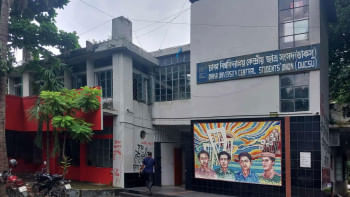Deepening political crisis adds to RMG woes
The deepening political crisis in the country has exacerbated the woes of apparel industry, with exporters facing difficulties in operating factories, shipping goods, and booking work orders.
Garment exporters fear that if their workers join the ongoing movement across the country, it will further dent the sector, which was hamstrung for four days when factories were completely shuttered due to violence in mid-July.
The sector also suffered serious repercussions two weeks ago because of a five-day internet blackout, which hindered communications between garment suppliers and international retailers and brands, meaning they could not make business deals or hold meetings.
Last week, international retailers and brands expressed concern at a meeting with the leaders of the Bangladesh Garment Manufacturers and Exporters Association (BGMEA), flagging the difficulties in communication with their headquarters and local suppliers.
They also pointed out that thousands of consignments were stuck at the Chattogram port for around a week.
Additionally, factories have been experiencing difficulties in booking work orders.
July, August and September are the peak months for the shipment of goods to be sold during the Christmas season. It is also when exporters book work orders for the following summer and spring seasons.
But because of the unrest that has persisted over the past two weeks, buyers are following a go-slow policy, which may continue in the near future.
For instance, the European Union (EU), Bangladesh's largest export destination, has already said it will not further negotiate with Bangladesh on a cooperation agreement in light of the present situation, which saw the deaths of at least 204 people, including students.
"We are apprehensive that garment workers may also be called to be involved in the movement," said former BGMEA President Md Shafiul Islam Mohiuddin.
Adding that hundreds of shipments could not be delivered on time, Mohiuddin said: "Altogether, we are in bad shape."
The garment sector, which was already struggling to recover from the severe fallouts of the Covid-19 pandemic, Russia-Ukraine war, Red Sea crisis and historic inflationary pressures on Western consumers, is now facing a domestic political crisis, he added.
Many have had to opt for expensive air shipments and provide discounts as they failed to ship goods timely due to a disruption in production following the internet blackout and shutdown of factories, he added.
"The biggest loss is the damage to the reputation of Bangladesh as a good supplying country. The country is now perceived as weak by international retailers and brands," said a European garment buyer, asking not to be named.
However, he added that his company was still booking work orders for upcoming seasons as factories are still operational.
He also said his company faced a shipment crisis as operations at the Chattogram port were moving at a snail's pace due to the internet disruption but added that shipments were now taking place smoothly.
He added that they would face further difficulties in shipment and placing work orders with local suppliers if the situation does not improve.
"My officers were sent to Chattogram to monitor the shipment problem as production was delayed, but they cannot return now in Dhaka," said a medium-level garment supplier, asking not to be named.
"The situation of booking work orders for next season is quite bad since I could not communicate with my buyers during the internet blackout," the factory owner added.
Arshad Jamal (Dipu), chairman of Tusuka Group, said the garment business is between two seasons as it is the peak time for the booking of work orders for next summer and spring as well as the peak time to send shipments ahead of Christmas.
He added that buyers were not willing to compromise on lead times.
Furthermore, the Red Sea crisis has also created a barrier to the timely shipment of goods.
Since October last year, international commercial vessels have had to travel an additional 3,500 kilometres around the Cape of Good Hope in Africa because of Houthi attacks along the Suez Canal, the main waterway between Asia and Europe.
This increased freight costs for international clothing retailers and brands.

 For all latest news, follow The Daily Star's Google News channel.
For all latest news, follow The Daily Star's Google News channel. 



Comments